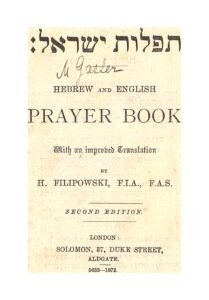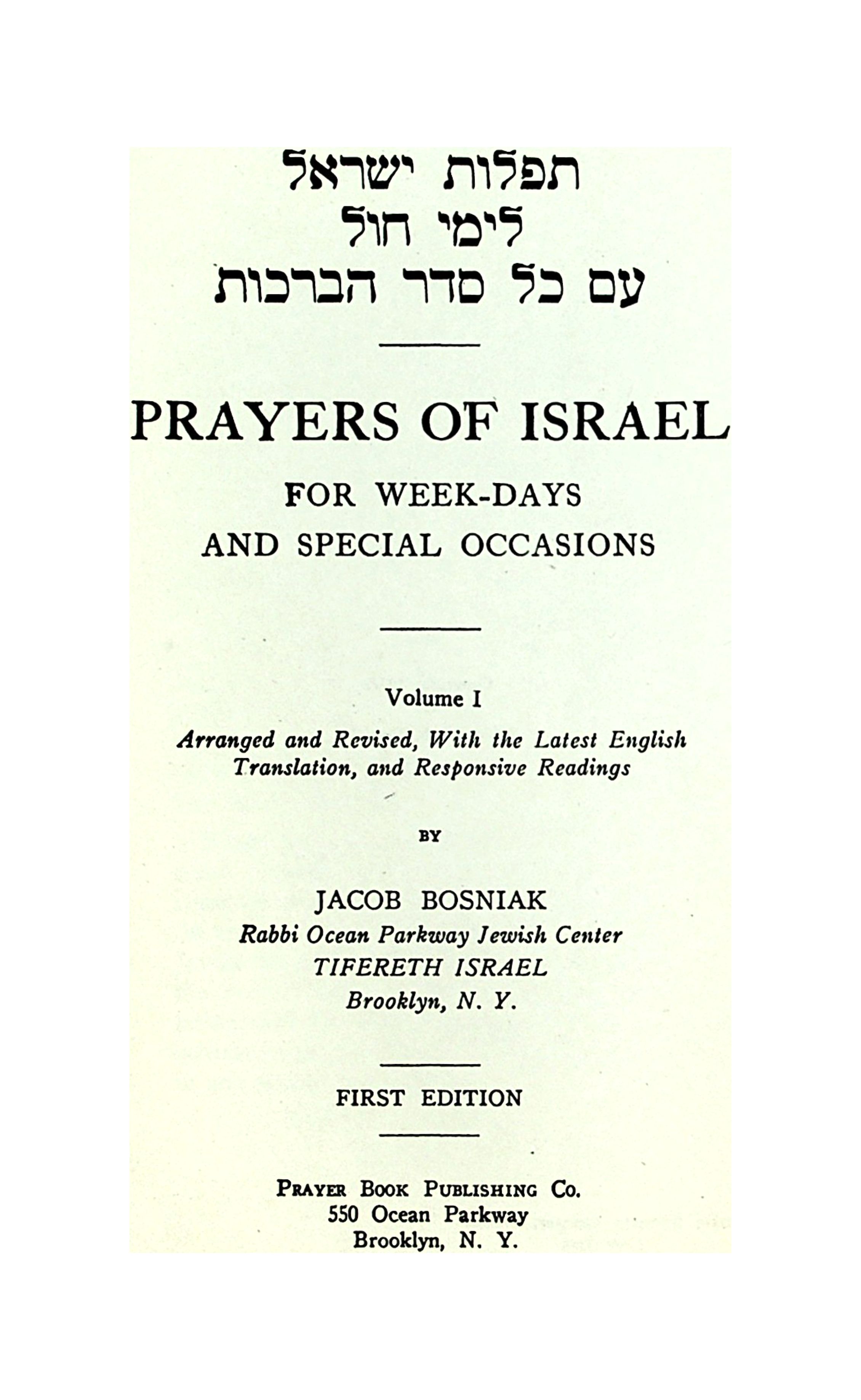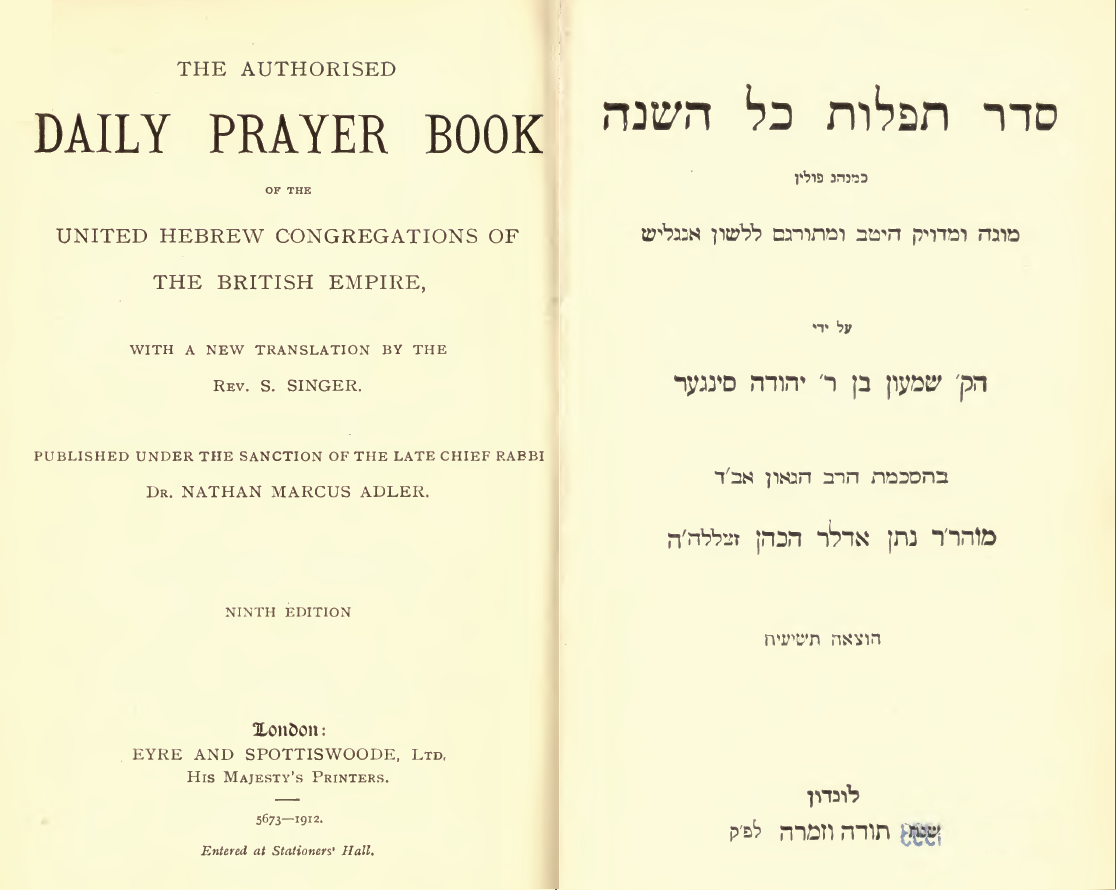This is the second printing of a nusaḥ Ashkenaz siddur compiled by Tsvi Herschell Filipowski containing his translations and even his own hand-cut Hebrew type. The first edition was printed in 1862; this second printing was published the year of his death in 1872.

This work is in the Public Domain due to its having been published more than 95 years ago.

“📖 תפלות ישראל (אשכנז) | Tefilot Yisrael, a bilingual Hebrew-English prayerbook translated and arranged by Tsvi Hirsch Filipowski (1862/1872)” is shared through the Open Siddur Project with a Creative Commons Public Domain Dedication 1.0 Universal license.
Tsvi Hirsch Filipowski (1816-13 July 1872), Hebraist and actuary, sometimes referred to as Herschell Phillips Filipowski. A maskil born in Virbalis, Lithuania, he arrived in London in 1839 and taught Jewish boys. In 1846 he published Mo’ed Mo’adim, a study of Jewish and other calendars, and in 1847 The Annual Hebrew Magazine (Hebrew title Ha-Asif, The Harvest’). His A Table of Anti Logarithms appeared in 1849, and his translation from Latin into English of Napier’s treatise on logarithms in 1857. In 1851, when he was listed in the Census as a London printer, he founded the Chevrat Me’orerei Yeshenim (Hebrew Antiquarian Society) in order to publish medieval Hebrew texts. Major works that he edited and printed for it included Menahem ibn Saruq’s Mahberet Menahem (1854) and Abraham Zacuto’s Sefer Yuhasin ha-Shalem (1857). During the late 1850s he worked in Edinburgh as an actuary, returning to London in about 1860. He compiled the Colonial Life Assurance Company’s 1861 Almanac and edited Baily’s Doctrine of Life Annuities and Assurance (1864-6). In 1862 he published, using a Hebrew type of his own design, Tefilot Yisrael, a pocket edition of the Ashkenazi prayer book with his own English translation. In 1867 he founded a short-lived periodical, The Hebrew National. His Biblical Prophecies (1870) dealt mainly with messianic passages in Isaiah.
Aharon Varady, founding director of the Open Siddur Project, is a copyright researcher and amateur book scanner. He prepares digital images and new digital editions of prayer books and related works in the Public Domain in order to make their constituent parts (prayers, translations, annotations, etc.) publicly accessible for collaborative transcription by project volunteers. (In some cases, he finds existing digital editions prepared by others that require correction and reformatting.) If you appreciate his efforts, please send him a kind note or contribute to his patreon account.
Stable Link:
https://opensiddur.org/?p=41275
Associated Image:
(This image is set to automatically show as the "featured image" in shared links on social media.)
Re-formatted:
ODT
Terms of Use:
Be a mentsch (a conscientious, considerate person) and adhere to the following guidelines:
- Properly attribute the work to Tsvi Hirsch Filipowski (translation) and Aharon N. Varady (digital imaging and document preparation).
- Clearly indicate the date you accessed the work and in what ways, if any, you modified it. (If you have adapted the work, let us know so that the contributor might consider endorsing your revision.)
- Provide the stable link to this resource: <https://opensiddur.org/?p=41275>.
- Indicate that the original work was shared under the Creative Commons Zero (CC 0) Universal license a Public Domain dedication. (To redistribute or remix this work in any format, modified or unmodified, you must refer to the terms of the license under which the work is shared.)
Additional Notes:
- The views expressed in this work represent the views of their creator(s) and do not necessarily represent the views of the Open Siddur Project's developers, its diverse community of volunteer contributors, or its institutional partners.
- We strongly advise against printing sacred texts and art containing divine names as these copies must be regarded with reverence, complicating their casual treatment and disposal.
- If you must dispose of a printed sacred text (one containing Divine Names), please locate the closest genizah (often established by a synagogue) and contact its custodians for further instructions. We also recommend using Morah Yehudis Fishman's Prayer for Adding a Work to the Genizah.
Support this work:
The Open Siddur Project is a volunteer-driven, non-profit, non-commercial, non-denominational, non-prescriptive, gratis & libre Open Access archive of contemplative praxes, liturgical readings, and Jewish prayer literature (historic and contemporary, familiar and obscure) composed in every era, region, and language Jews have ever prayed. Our goal is to provide a platform for sharing open-source resources, tools, and content for individuals and communities crafting their own prayerbook (siddur). Through this we hope to empower personal autonomy, preserve customs, and foster creativity in religious culture.
ויהי נעם אדני אלהינו עלינו ומעשה ידינו כוננה עלינו ומעשה ידינו כוננהו "May the pleasantness of אדֹני our elo’ah be upon us; may our handiwork be established for us — our handiwork, may it be established." –Psalms 90:17










Leave a Reply